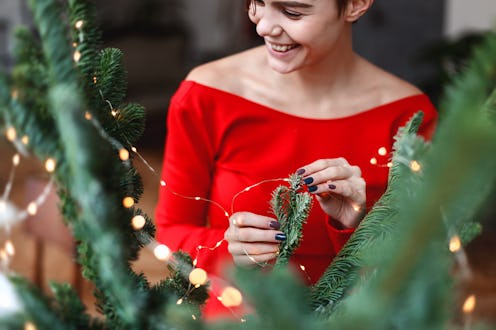Life
How To Tell If Your Christmas Tree Is Making You Sick
When it comes to my Christmas tree, I thought the only thing I had to worry about was keeping the string lights from setting it on fire. It turns out there's a whole new concern making headlines: Christmas tree syndrome. At first, this got me excited. Christmas tree syndrome? Does it mean you take Christmas trees with you wherever you go? Do you keep your tree up year round? Does it mean you obsess over decorations and tree toppers? That sounds like an illness I want. It turns out, though, there's more to it than that. While it shouldn't keep you up at night, you know what they say: knowledge is power. Here's what you need to know about Christmas tree syndrome.
Where Does Christmas Tree Syndrome Start?
A lot of it comes down to mold and mold spores. Christmas trees are a source of mold, and you don't need me to tell you how dangerous that can be for your health. With 13 percent of Americans suffering from some kind of mold allergy, it would make perfect sense that these same people react negatively when in the presence of a Christmas tree.
Add to that the abundance of mold spores both indoors and outdoors, and our odds are looking grim.
Out of the roughly one million fungal species on our planet, over 100 of these families can lead to mold allergies. At certain levels, spores can become dangerous for people with allergies or asthma.
The Research On Christmas Trees
What does science have to say? One 1970 paper by Dr. Derek M. Wyse, called "Christmas tree allergy: mold and pollen studies," said that around seven percent of people with allergies experienced a jump in symptoms when there was a Christmas tree in their home. Then, in 2007, Dr. Phillip Hemmers shared that he'd found that mold spores multiplied by more than five during two weeks of the holiday season. Fast forward to 2011, when Dr. Lawrence E. Kurlandsky and his team published findings from their own study: in sample clippings from 28 Christmas trees, they found 53 species of mold, 70 percent of which were possibly harmful.
So basically, trees can be hazardous to your health, right? Not so fast.
What's The Consensus?
While there is some evidence pointing to the health risks associated with having a Christmas tree in your home, there are a few (big) disclaimers. For starters, that evidence is inconsistent, inconclusive, and vague. For instance, with Dr. Wyse's research, he had measured the variety of mold spores in 10 homes, and concluded that his results weren't totally valid — because the type of mold in each home was different. You can't accurately determine patterns or trends with this many variables.
Furthermore, it's important to acknowledge that during the cold winter months, you can suffer from numerous ailments for all kinds of reasons. Studies suggest the body's defense system can't function as well in colder temperatures, which could help explain the peak in colds, flu, and asthma attacks we see in the winter.
Plus, while you could be allergic to Christmas trees, it's tough to say which part of the tree specifically. Is it the lumber or sawdust? How about the pollen or sap? All of these allergens can cause problems for people who are sensitive to them.
The takeaway is this: if you're feeling under the weather and also have a Christmas tree in your home, you can't simply connect the two to establish cause and effect.
What Can You Do?
If you haven't experienced allergies, you probably don't need to do anything. If you do have concern surrounding the Christmas tree in your home (and don't want to get an artificial one), here are some tips.
- Wash your tree and let it completely dry outside before bringing it in. Mold likes moisture!
- Spray the tree with a combination of water and a bit of bleach. This further helps eliminate mold and will not damage the tree.
- Thoroughly shake it outside to get rid of some of the dust, pollen, and other debris.
- Attack it with a leaf blower to further clean it out.
- Don't leave the tree in your home too long. Once the holiday is over, treecycle it.
